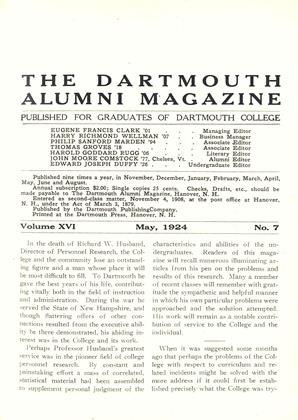By FREDERICK A. BUSHEE '94. Henry Holt and Company, N. Y. 1923. Pp. XIII, 577.
In this book the writer, a Professor of Economics and Sociology in the University of Colorado, has given us a comprehensive survey of the subject matter of Sociology. Starting with Comte's distinction between dynamic and static sociology, the writer elects for the dynamic method and seeks to "analyze those factors and forces that cause changes in social conditions and improvements in social life." It is his purpose, therefore, to write a book that "will deal primarily with the laws of progress rather than with the problems of present day institutions."
Assuming the fact of progress—there is nowhere in the book a critical discussion of the problem of progress—the writer defines progress as "the achievement of the maximum of life" and plunges into a treatment of his subject with this idea of progress as his goal and measure of values. Part one deals with the "general principles of progress" which are defined mainly in biological terms such as adaptation, integration, variation and selection. The social forces making for progress are found in the biological background of desires which fall under two heads, physical and mental. Physical desires are of two kinds, desire for self-preservation and desire for race continuance. Mental desires are likewise of two kinds, "desir-e for approbation" and "consciousness of life" expressed through morality, art, science and religion. Part two, a discussion of "economic and political factors" in progress, deals with the means of satisfying the desire for self-preservation. Part three, the "genetic factors" of progress, deals with the means of satisfying the desire for race continuance. In this part are some of the best chapters of the book. Part four, the "psychological factors" in progress, deals with the desire for approbation and its manifestations. Part five, the "cultural forces" making for progress, treats of morality, art, science and religion.
It will be seen that the book is strenuously logical. Professor Bushee treats his wealth of material based upon wide reading in a magisterial fashion that never leaves the reader uncertain as to his meaning. The critical reader may grow skeptical at the harmonious hymn in praise of progress the facts are made to sing. The psychologically minded sociologist will find in the author's purposeful ignoring of social psychology a weakness, for the writer in spite of his purpose is forced to make use of psychology and that in a vague and ill-defined way as appears in his treatment of desire. Professor Bushee, however, is to be congratulated upon producing a work, crammed with solid learning, written in a clear and informing fashion and illuminated by an idea of progress which, though lacking critical justification, provides an effective instrument for articulating and interpreting that vast and confusing field of facts known as sociology.
 View Full Issue
View Full Issue
More From This Issue
-
 Article
ArticleTHIRTY YEARS OF ALUMNI REPRESENTATION ON THE BOARD OF TRUSTEES
May 1924 By James Fairbanks Colby '72 -
 Article
ArticleFROM THE UNDERGRADUATE CHAIR
May 1924 By F. L. Janeway -
 Article
ArticleDARTMOUTH IN THE SEVENTIES III
May 1924 By Samuel L. Powers '74 -
 Article
ArticleIn the death of Richard W. Husband
May 1924 -
 Article
ArticlePROFESSOR RICHARD WELLINGTON HUSBAND
May 1924 By Charles Darwin Adams -
 Class Notes
Class NotesClass of 1903
May 1924 By Perley E. Whelden
John M. Mecklin
-
 Books
BooksFACULTY PUBLICATIONS
May, 1922 By JOHN M. MECKLIN -
 Books
BooksProhibition
FEBRUARY, 1928 By John M. Mecklin -
 Books
BooksMANUFACTURING
FEBRUARY 1929 By John M. Mecklin -
 Books
BooksCOLLECTED PAPERS OP HERBERT DARLING FOSTER
APRIL 1930 By John M. Mecklin -
 Books
BooksAMERICAN HERETICS AND SAINTS
November 1938 By John M. Mecklin







